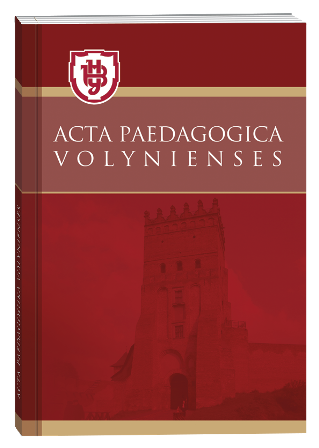ADDRESSING THE PROBLEM OF FORMATION OF MORAL AND ETHICAL QUALITIES OF A FUTURE MUSICAL ART TEACHER
DOI:
https://doi.org/10.32782/apv/2022.1.2.10Keywords:
humanism, spirituality, ethical culture, pedagogical ethics, morality, moral and ethical qualities and skills, musical education and upbringingAbstract
The article highlights the issue of forming moral and ethical qualities of future musical art teachers in the context of modern problems related to professional training of a teacher, their ethical culture and behavior. The authors consider the process of ethical and pedagogical views in the context of the humanization of the educational process. Morality is the highest degree in the system of values. The essence of morality is forming person’s own point, values marks, interests and needs. Because every human’s action or behavior can be judged from moral point of view. The development of morality begins with the accumulation of knowledge of moral norms, awareness of their significance for oneself. The teacher's ethics is viewed as a complex combined education, an essential feature of their personality. Basically, it acts as a regulator of the teacher's relationship with students and is based on certain moral requirements for the nature of such interaction. The teacher’s moral and ethical properties are viewed as a product of their social life. A special role in forming moral and ethical qualities of the future musical art teacher belongs to musical education, which result is comprehensive intellectual, spiritual and moral development. Music as one of the art forms is an influential tool of learning life and the world around us. Folk music is important in the field of music education as a unique combination of sensual and moral principles in forming a harmonious personality. What should a modern teacher be like? What principles should they follow to in relations with students? What ethical, pedagogical and moral requirements are imposed on a teacher of musical art? Such questions are raised today by pedagogical science and practice. In the article the authors offer their views on role and purpose of the teacher as a carrier of modern educational and social ideals, spirituality and morality.
References
Амонашвілі Ш.А. Психологічні основи педагогіки співробітництва. Київ : Освіта, 1991. 110 с.
Вітвицька С.С. Естетичне виховання майбутнього вчителя в контексті ідей В.О. Сухомлинського. Естетичне виховання дітей та молоді: теорія, практика, перспективи розвитку: збірник наукових праць за ред. О. Дубасенюк, Н. Сидорчук. Видавництво ЖДУ ім. І. Франка. Житомир, 2012. С. 146.
Зуєнко Н. Діалогова сутність зорієнтованої парадигми освіти. Педагогіка вищої та середньої школи. Збірник наукових праць. Кривий Ріг, 2014. С. 191–197
Кларин В.М., Джуринский А.Н. Педагогическое наследие. Москва : Педагогика, 1989. С. 81.
Концепція Нової української школи. URL: http://mon.gov.ua/activity/education/zagalna-serednya/ua-sch-2016/konczepcziya.html
Нова Українська школа : порадник для вчителя / За заг. ред. Н. Вівік. Київ : Видавничий дім «Плеяди», 2017. 206 с.
Cуxoмлинcький В. Cтo пopaд учитeлeвi. Вибp. Твopи : В 5-ти т. Київ : Paдянськa шкoлa, 1977. Т. 2. C. 419–654.
Томашівська М.М. До проблеми формування ціннісних орієнтацій майбутніх учителів музики. Інноваційна педагогіка Причорноморського науково-дослідного інституту економіки та інновацій. Теорія і методика виховання. Вип. № 3. Одеса, 2018. C. 269–271.
Хуа Вей. Критеріальний аппарат діагностування творчого потенціалу майбутніх учителів музики. Актуальні питання мистецької освіти та виховання. Суми : Збірник наукових праць. Вип. 1(9), 2017. С. 167–175.
Чeркacoв В.Ф. Теорія i методика музичної ocвiти : підручник. РВВ КДПУ iм. В. Винниченка. Кiрoвoгрaд, 2014. 528 c.







